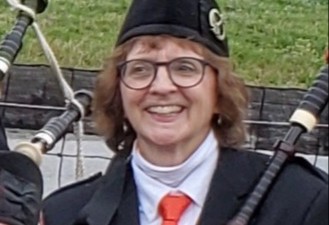Carol Scheppard: Banishing Imposter Piper Syndrome

I always loved the pipes, so when I had the opportunity to get lessons, I jumped on it.
I started piping nine years ago. I heard the Shenandoah Pipe Band playing an event, and the pipe major said she gave lessons. I asked her to take me on as a student, and started a week later with a practice chanter. I wanted to be a good enough player to play in the band.
I was a year on the practice chanter before I got my pipes. Then another year just learning to kick in. I had trouble with breathing, making a decent sound, memorizing tunes.
It seemed I practiced and practiced and never made any improvement.
I thought I was definitely too old – I was in my 50s when I started) – and like I would never "get it". I had played lots of wind instruments before (clarinet, flute, bassoon), but this was way harder than any of those and very different.
When I first started at the Dojo, I started by doing a non-live course, back then it was called "Baby Steps to Bagpipe Freedom" and I didn't understand the rationale behind it all. So I tried and tried and never did anything right and couldn't understand why my tapes were being rejected over and over. Once I got started with live courses and saw how everyone got the same sorts of feedback and learned more about the rationale behind the Dojo method, I felt better about it and started to work within the system.
Being part of the Dojo community is fabulous for a number of reasons. The quality of instruction is amazing and supportive, and to be part of a community taking seriously this difficult enterprise really gives me a sense of purpose and an ability to stay focused, play every day, and make real progress.
I have attended Sandy Jones' North American Academy of Piping for a number of years. Being at the Dojo is like being at the Academy all year round.
The Dojo has helped be believe I can do this and has given me enough practical and beneficial instruction to have evidence that that is so. My bagpipes are easier to play, they "fit" me better, and I can play with confidence.
I'm in the tuning phase right now, but even though I have yet to pass, I definitely am better at getting the pipes in tune without it being a major project.
Thanks to what I've learned, I have tackled some tough tunes in the Band's repertoire that I wouldn't even have considered a couple years ago. Now I've got them up and running and ready to go when we get back to doing regular gigs again. My hands are less tense. I'm working now on proper hand placement, but I know what I need to do (better than before). I'm still battling crossing noises, but I can hear them now, can work specifically in practice sessions to get rid of them, and know many of the troubled spots to watch for.
I no longer feel like an imposter when I say I'm a piper. I've decided I want to take this seriously, and I have the confidence that I can become a strong, competent performer. I still need to work on the nerves, but even that is getting better as I play regularly for my Dojo recordings.
I still haven't made the competition plunge, but I have to audition every year for NAAPD, and this year I placed into one of the better classes and felt confident (and appropriately placed) all week.
I finally just felt like a "legitimate" piper.
Carol Sheppard, Virginia, USA





